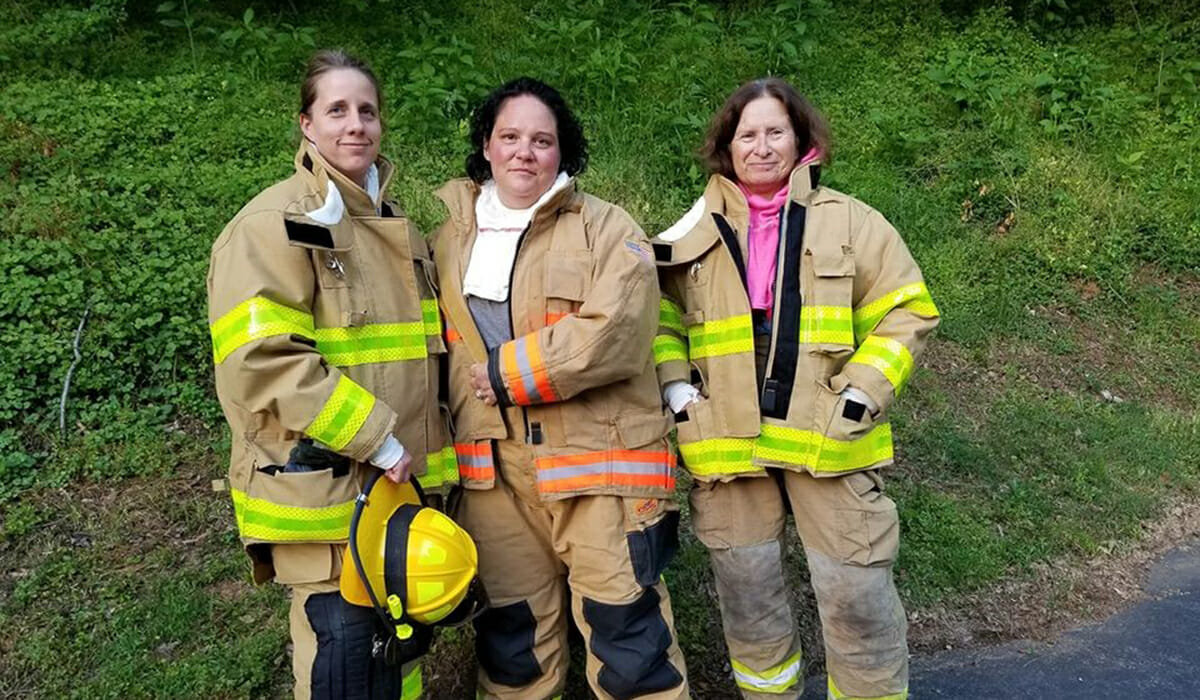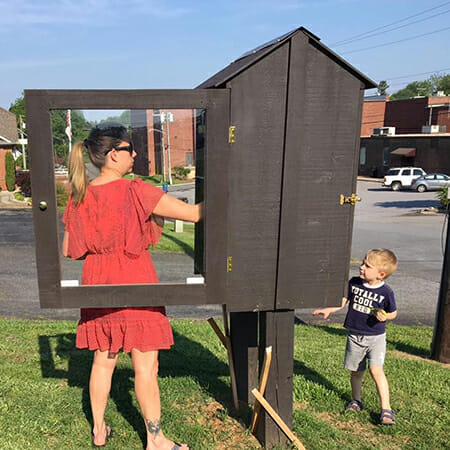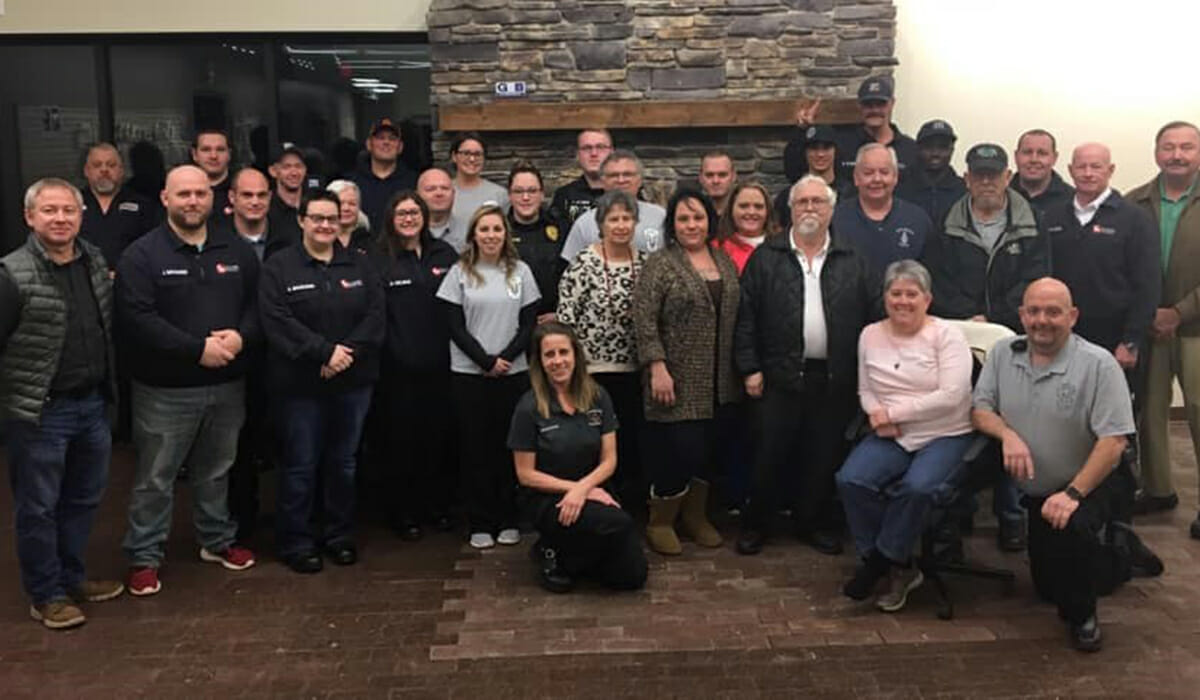Volunteer Firefighter Makes a Difference In North Carolina Community by Starting Both a Mental Wellness Program and a Food Pantry

Meet Daily Point of Light Award honoree Misty Matthews. Read her story and nominate an outstanding volunteer or family as a Point of Light.
By creating two different programs for her North Carolina community, Misty Matthews is doing more than her part to improve the health and wellbeing of her fellow neighbors. The volunteer firefighter helped start Elkin Fire Department’s mental wellness program, which is working to not only improve the mental health of her fellow first responders, but is also trying to tackle the longstanding stigma against talking about mental health within the first responder community. Misty works all year holding events to teach first responders about their mental health and how to manage their feelings, as well as bonding events to bring all of Elkin’s first responders together.
In addition to her work with the first responder community, Misty also started Helping Hands, a community food pantry within the Yardkin Valley. Misty organized the creation of nine different pantries which she and other community members fill with food for anyone in need to take. She also provides toiletries and items such as gloves and scarves during the winter. Through helping to fight both mental illness and food insecurity, Misty is making a difference in her community members’ lives.
Describe your volunteer role with with the Elkin Fire Department, specifically your role with the mental wellness program.
I’ve been with the fire department for three years. I am not one who wants to rush out to fires or emergencies, so we figured out what my passion was and my passion is people. One major thing going on in a lot of fire departments, and of course any first responders, is mental illness because of the things they deal with and see. What we wanted to do was start a pilot program to help our firefighters realize that it’s normal and that we’re available to help and they won’t lose their job. Back in the day, they would teach firefighters [to] “suck it up buttercup, don’t talk about it.” That’s ingrained in firefighters and it’s very hard to un-train firefighters from that thought. What we’re trying to do is un-train that. Retrain them to think, “It’s OK to feel how I feel and what I’m going through.” Then we try to teach them ways to manage some of their feelings, such as mediation and yoga and breathing and taking time for themselves and above all, seeing a counselor. A lot of them aren’t comfortable with that avenue yet but it’s a process. What we started to do is we expanded it, because our firefighters and our police department and our rescue squad and our EMS, they all go to the scene, so we expanded it to the Elkin first responders. We hold about four events a year. It’s separate funds, we aren’t using the fire department funds. We fundraise and have events throughout the year to bring all the departments together so they can bond and get to know each other on a personal level. Once a year we have a mental wellness speaker to help guide them as well.

What inspired you to start the mental wellness program?
We kept hearing a lot about it. [Fire and Life Safety Team Captain Theresa Knops] goes to a lot of seminars and that’s been a big topic of discussion. She presented it to me because I’m part of Company A … [which] she wanted to be in charge of peer support, if that was something I was interested in, and I’m like, “I can give it a shot.” I care about mental wellness and overall health for people, so I said, “Let me see where it goes.” We were kind of playing around with it, seeing what I could learn. I took the NC peer support [class] … and got some ideas. We did a ‘Feeling Friday’ on Facebook. Every Friday you put an emotional statement up there. We started with that, and then we’ll get a speaker once in a while to come in and talk about mental wellness. We will do our research to find counselors who are familiar with first responders and we hand that information out as well. Our goal is constantly reminding our firefighters that it’s OK to feel this way. A lot of our firefighters are firefighters elsewhere who don’t have a peer support program, so some of them will come to us and release their feelings with us because they know it’s a safe place. That’s what we’re trying to do, is let them know it’s safe and we’re not going to judge them, and they don’t have to worry about their jobs or how they’re viewed.
Why is mental wellness so important for first responders?
The suicide rate is very high in anyone in the first responders line of work. When they see something or they come on the scene, sometimes they can see 100 of them and nothing bothers them. Sometimes it could be a small event or it could be a large event. If they just started having children and they go to a scene where there’s a child involved, then that’s usually [a breaking point.] There tends to be a breaking point at some point because a lot of them put it away. They file it away. They make jokes about it. They laugh about it. But at some point, it catches up to them. They don’t notice they’re doing it, but they’ll pull away from their families, they’ll pull away from their friends, they’re shorter in their temper, and then some tend to drink. Then they can’t talk about it, because they feel embarrassed because their partners aren’t going through that, when a lot of them are — but again it’s the same story, it’s they don’t want to talk about it. They’re constantly filing away, putting it away, and they get deeper in a hole, and one day they just break and that’s when they commit suicide. We’re hoping at some point when we get this going and well, we’ll learn how to help the families deal and help their partners when they’re going through things, because sometimes they’ll be the one to reach out to us. We have a couple events where families are included because we want them to feel comfortable to say, “Hey, listen, my husband, a firefighter, or my wife, a firefighter, is going through some things and I don’t know what to do.” We’re able to help them help their partner.
Can you talk about your volunteer work with Helping Hands?
I started Helping Hands about three years ago. People always post on Facebook where others are doing great things, and I did the same thing. I posted blessing boxes. Then I’m like “OK, I think it would be great to put one in the community,” so I talked to one of my friends and we said we can build one. I work for the Chamber of Commerce, so I sent out an email to our members that said “I need someone to build a blessing box, if you’re interested let me know.” I had a few volunteers. We have nine in the community that we service, so we promote those nine. There’s many more. Churches have put them out. Elementary schools have put them out. I found sponsors for the pantries that we service. I have people donate food to me, and I do fundraisers to get money so I can purchase food for the families. I only focus on my nine. I don’t put food in the other ones [started by the churches and schools], but I do promote them so others can help keep food in them. They’ve been out for about three years. They go empty almost every day. They’re really hard to keep food in them, especially right now when a lot of people are out of work. It’s very helpful. The summertime when kids are out of school and they’re not getting those hot meals, they seem to empty out a lot faster.
People used to leave us notes in them. There was a lady who had five children and she said she didn’t know how she would feed her children without the pantry. That pushed us to keep going. Sometimes we get a little disheartened because you don’t know who is using it or abusing it, but my feeling is, God has led me help to put food in the pantry and it’s up to God whomever is using them, it’s not my place anymore. We try to do toiletries and food and anything that people need. Around winter time, we’ll throw gloves and scarves and hats in them.

What’s been the most rewarding part of your work?
Knowing I’m helping and showing my children that even though you don’t have a lot of time and you don’t have a lot of money, you can still make a difference.
Why do you think it’s important for others to give back?
I think it reminds people about compassion and caring for others and helps them think beyond themselves. We’re all in this world together, and we’ve got to all have each other’s backs in order to get through this, especially times like this.
What do you want people to learn from your story?
Be compassionate to others. Even if there’s not a lot of time and money, you can make a difference in your community. Any little thing. I’ve done a lot of little things with my children that took us no time, and it was family time, too. We … talked to a local florist who gave us a bunch of flowers and we just put them in people’s car windows and handed them out. Little simple things that cost no money and time and makes you feel good.
Do you want to make a difference in your community like Misty? Find local volunteer opportunities.
